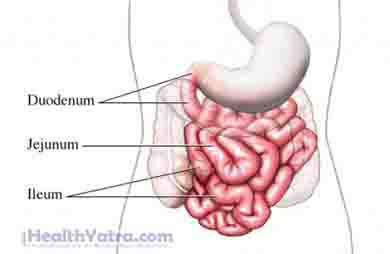Definition
Short bowel syndrome is a complication that can occur in people who have part or all of their small intestine removed.

Causes
Short bowel syndrome occurs when so much of the small intestine is removed (usually half or more) that there is inadequate surface area in the small intestine for the absorption of vitamins and minerals from food.
Risk Factors
A risk factor is something that increases your chance of getting a disease or condition.
The following factors are thought to increase the risk of short bowel syndrome:
- Crohn’s disease (the most common reason for the removal of the small intestine)
- Vascular problems
- Premature birth
Symptoms
Symptoms of short bowel syndrome may include:
- Diarrhea
- Cramping
- Bloating
- Heartburn
- Malnourishment
- Dehydration
- Weakness
- Fatigue
- Depression
- Weight loss
- Bacterial infections
- Food sensitivities
Diagnosis
Your doctor will ask about your symptoms and medical history, and perform a physical exam. He or she will also likely perform blood tests to check for nutritional and absorption problems.
Treatment
Talk with your doctor about the best treatment plan for you. Treatment options include:
Nutrition
If you are malnourished, your doctor may give you food, fluid, and electrolytes through an IV. You will be advised to gradually increase your caloric intake and avoid certain foods. Initially, your diet will be high-protein, low-fat, and lactose-free.
Medications
In addition to changing your diet, you may need to receive vitamin and mineral supplementation. Antidiarrheal medications and medications that slow the contraction and relaxation of the intestinal muscles can also slow your digestion so you can absorb more nutrients. Depending on your symptoms, your doctor may prescribe an H2 antagonist, proton pump inhibitor, cholestyramine , and/or octreotide .
Surgery
Transplantation of small bowel is an option for patients who cannot maintain their nutritional status with the above treatments.
Prevention
There is no known way to prevent short bowel syndrome.
